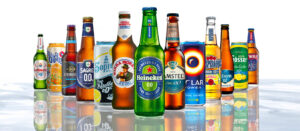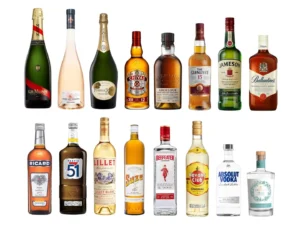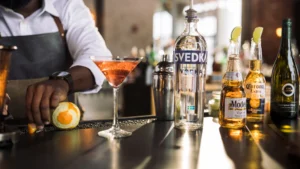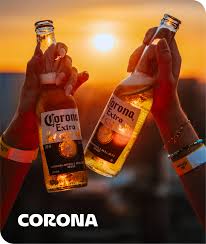The global alcoholic beverage brands continues to grow and evolve, with emerging trends, innovative products, and expanding markets. Here’s a look at the top 10 alcoholic beverage brands poised to make waves in 2024, ranging from legacy giants to promising newcomers.
1. Kweichow Moutai (China)
Kweichow Moutai is the largest alcoholic beverage brands globally, with a staggering market capitalization of over $243 billion. This premium Chinese liquor producer dominates the market with its baijiu, a potent spirit made from sorghum. In 2024, the brand is expected to continue its aggressive expansion into global markets, capitalising on increasing demand for baijiu in luxury circles. Moutai’s deep cultural significance in China also drives domestic sales, while its international foray into high-end establishments further strengthens its position.

- Revenue: Over $243 billion market capitalization
- Employees: Estimated 30,000+
- Factories: Moutai primarily operates in China, with its production centred in the town of Maotai.
- Product Focus: Kweichow Moutai produces baijiu, a traditional Chinese spirit, known for its strong, distinct flavour made from sorghum. The brand is synonymous with luxury in China and is expanding globally to elite markets.
2. Anheuser-Busch InBev (Belgium)
The world’s largest brewer, Anheuser-Busch InBev (AB InBev), controls iconic beer brands like Budweiser, Corona, and Stella Artois. In 2024, the company is expected to emphasise sustainability and innovation in its product portfolio. AB InBev’s efforts to reduce its environmental footprint, including cutting water and energy usage, along with its focus on no- and low-alcohol beers, make it a key player to watch as consumers lean toward healthier and environmentally friendly options.

- Revenue: $59.4 billion in 2023
- Employees: 154,450 as of 2023, with a 7.3% decline in headcount compared to 2022
- Factories: Over 170 breweries globally across 50 countries
- Product Focus: AB InBev’s portfolio includes top-selling brands like Budweiser, Corona, and Stella Artois. Their beer products are known for their light, refreshing taste. The company is focusing on non-alcoholic options like Budweiser Zero, responding to the growing health-conscious market.
3. Diageo (United Kingdom)
With a massive portfolio of leading alcoholic beverage brands, Diageo continues to dominate the global alcoholic beverages market. Its flagship products, including Johnnie Walker, Smirnoff, and Guinness, have cemented its place as a top producer. In 2024, Diageo’s growth will be fueled by increased demand for premium spirits and its aggressive moves into the ready-to-drink (RTD) cocktail sector. Additionally, Diageo’s digital transformation initiatives are set to enhance customer engagement and expand its market presence.

- Revenue: $23.4 billion in 2023
- Employees: Over 27,000
- Factories: Diageo operates across 180 countries with distilleries in Scotland, Ireland, and the United States.
- Product Focus: Famous for premium brands like Johnnie Walker, Guinness, and Smirnoff, Diageo has a diverse range of spirits. Their product innovation includes flavored variations of their classic spirits, such as Johnnie Walker Blue Label Ghost, targeting the luxury spirits segment.
4. Heineken (Netherlands)
Heineken is renowned for its global beer portfolio, including the flagship Heineken beer and Amstel. The brand’s innovation in crafting no- and low-alcohol variants is expected to push growth in 2024 as it continues to respond to changing consumer preferences. The company’s push into non-alcoholic beverages, including Heineken 0.0, positions it as a key competitor in the evolving alcohol-free sector. Heineken’s efforts in sustainability and smart packaging are also expected to play a significant role in its future success.

- Revenue: $28.7 billion (2023)
- Employees: Approximately 85,000 globally
- Factories: Heineken operates more than 165 breweries in over 70 countries.
- Product Focus: Known for its crisp and slightly bitter pilsners, Heineken is also expanding into non-alcoholic beer with Heineken 0.0 to meet growing consumer demand for healthier alternatives.
5. Pernod Ricard (France)
Pernod Ricard, the parent company of Absolut Vodka, Jameson Irish Whiskey, and Chivas Regal, ranks among the world’s largest spirits producers. In 2024, Pernod Ricard’s focus on innovation and premiumization of its products will keep it competitive. The company is also making strides in sustainability and diversity efforts, while continuing to expand in the rapidly growing Asian markets. New product launches and a focus on personalization will be key elements of its 2024 strategy.

- Revenue: €11.5 billion in 2023
- Employees: 18,000 globally
- Factories: Operating in more than 160 countries with key production facilities in Europe and the U.S.
- Product Focus: Pernod Ricard produces a wide variety of spirits, from the smooth flavors of Absolut Vodka to the rich taste of Chivas Regal whiskey. They are positioning themselves to grow in the premium spirits sector, with a focus on sustainability and organic product offerings.
6. Constellation Brands (United States)
Constellation Brands has become synonymous with innovation and brand expansion, thanks to its popular beer brands like Corona and Modelo. Additionally, its strong position in the wine and spirits sector with brands like Robert Mondavi and Svedka Vodka makes it one to watch in 2024. Constellation’s strategic investments in the cannabis industry and its focus on premium beverages will drive its market performance. The company’s push into healthier alcohol alternatives, like low-calorie beers and organic wines, is expected to continue.

- Revenue: $9.5 billion in 2023
- Employees: Approximately 10,000
- Factories: Constellation operates multiple wineries and breweries across the U.S. and Mexico.
- Product Focus: Known for beers like Corona and Modelo, Constellation is expanding into premium wines and spirits. Their portfolio includes high-end wines from the Robert Mondavi line, which are known for their complex flavor profiles and aging potential.
7. Wuliangye Yibin (China)
Like Kweichow Moutai, Wuliangye Yibin is a prominent producer of baijiu and is the fourth-largest spirits company in the world. As Chinese spirits continue to gain global traction, Wuliangye Yibin is expected to capitalize on this growing demand. The brand’s strong domestic sales and its focus on international expansion, particularly in markets like Southeast Asia and North America, will drive its growth in 2024. Wuliangye’s luxury positioning makes it a favorite among high-end consumers.

- Revenue: $18 billion market capitalization
- Employees: Over 30,000
- Factories: Primarily operates in Sichuan Province, China, with some expansion into Southeast Asia.
- Product Focus: Another major baijiu producer, Wuliangye is known for its sweet, fragrant spirits, which are gaining traction in the international market. The brand is focusing on the luxury spirits market as demand for baijiu grows outside China.
8. Ambev (Brazil)
Ambev, a subsidiary of AB InBev, dominates the South American alcoholic beverage market. It operates iconic brands like Brahma and Skol and plays a crucial role in beer production across Latin America. Ambev’s innovation in the beverage space, including moves toward energy efficiency and sustainability in packaging, has positioned it well for continued growth in 2024. The brand’s expansion into non-alcoholic beverages and RTDs will also contribute to its future success.

- Revenue: $13 billion in 2023
- Employees: 47,000 globally
- Factories: Ambev operates more than 30 breweries in Brazil and other Latin American countries.
- Product Focus: Ambev’s best-known brands include Brahma and Skol. Their beers are characterized by a light, refreshing taste, making them popular in tropical climates. Ambev is also increasing its production of non-alcoholic beverages to cater to changing consumer preferences.
9. Brown-Forman (United States)
Famous for its flagship brand, Jack Daniel’s, Brown-Forman has established itself as a powerhouse in the whiskey market. Its portfolio includes other premium spirits like Woodford Reserve and Old Forester. In 2024, Brown-Forman is expected to benefit from the continued boom in American whiskey sales, both domestically and internationally. Additionally, the company is focusing on sustainability, which includes efforts in responsible sourcing and environmental stewardship.

- Revenue: $4.2 billion in 2023
- Employees: Over 4,800
- Factories: Brown-Forman operates distilleries primarily in Kentucky (Jack Daniel’s) and internationally for its Woodford Reserve and Old Forester brands.
- Product Focus: Brown-Forman’s whiskey products are known for their rich, complex flavors, driven by meticulous barrel aging processes. The company is focusing on premium whiskey as consumer demand for American whiskey continues to rise.
10. Beam Suntory (Japan/United States)
Beam Suntory, known for Jim Beam Bourbon and Suntory Japanese Whisky, is a global spirits giant with a dual heritage in the U.S. and Japan. In 2024, Beam Suntory is poised to capitalize on the growing popularity of Japanese whisky, which has seen a significant surge in global demand. Its commitment to premiumization and innovative product launches will be key to its strategy. Furthermore, Beam Suntory’s sustainable distillation practices and emphasis on craftsmanship are expected to enhance its reputation among discerning consumers.

- Revenue: $4.6 billion in 2023
- Employees: 4,700 globally
- Factories: Beam Suntory operates distilleries in Kentucky and Japan, including the Jim Beam Distillery and the Yamazaki Distillery.
- Product Focus: Beam Suntory is famous for its bourbons and Japanese whiskies. The company emphasizes premium quality and craftsmanship, especially in its Japanese whisky offerings, which are known for their smooth, refined taste.
Key Trends to Watch in 2024
As the industry moves forward, several trends will define its trajectory. One of the most significant shifts is the rise of health-conscious consumers, driving the growth of no- and low-alcohol products. Brands like Heineken and Diageo are capitalising on this trend by expanding their low-alcohol offerings. The sustainability movement is another vital area, with companies such as AB InBev and Ambev leading the way in eco-friendly packaging and energy-efficient production processes. Additionally, premiumization continues to shape the industry as consumers opt for higher-quality, often more expensive, products.
Conclusion
The alcoholic beverage brands in 2024 is set to be shaped by both legacy brands and innovative newcomers, driven by evolving consumer preferences and trends. With an increased focus on health, sustainability, and premium products, the top brands on this list are well-positioned to lead the market into the future. Keep an eye on these players as they innovate, expand, and shape the global landscape of alcoholic beverages.

